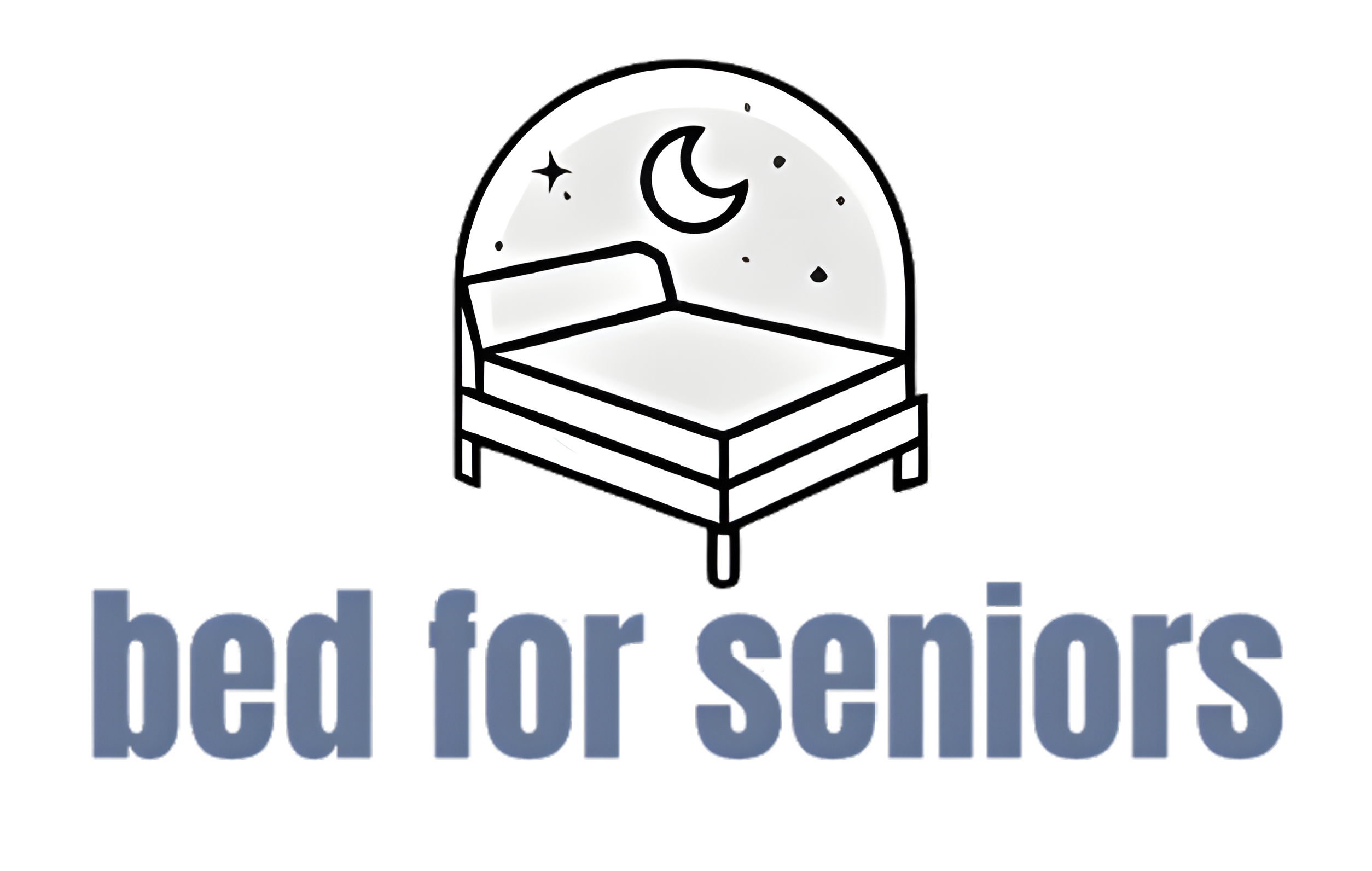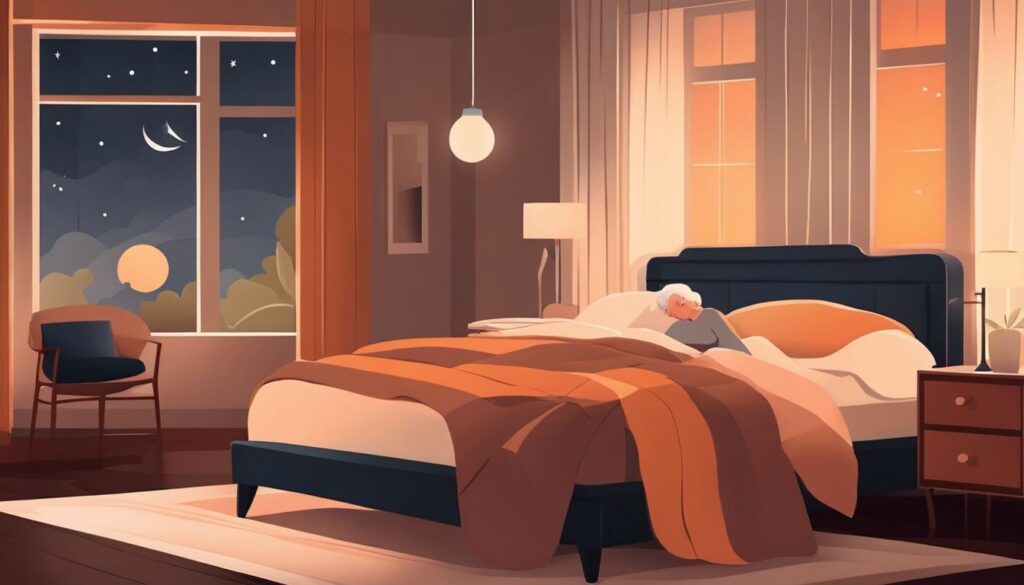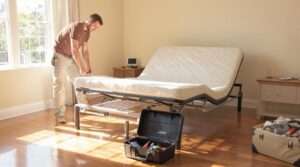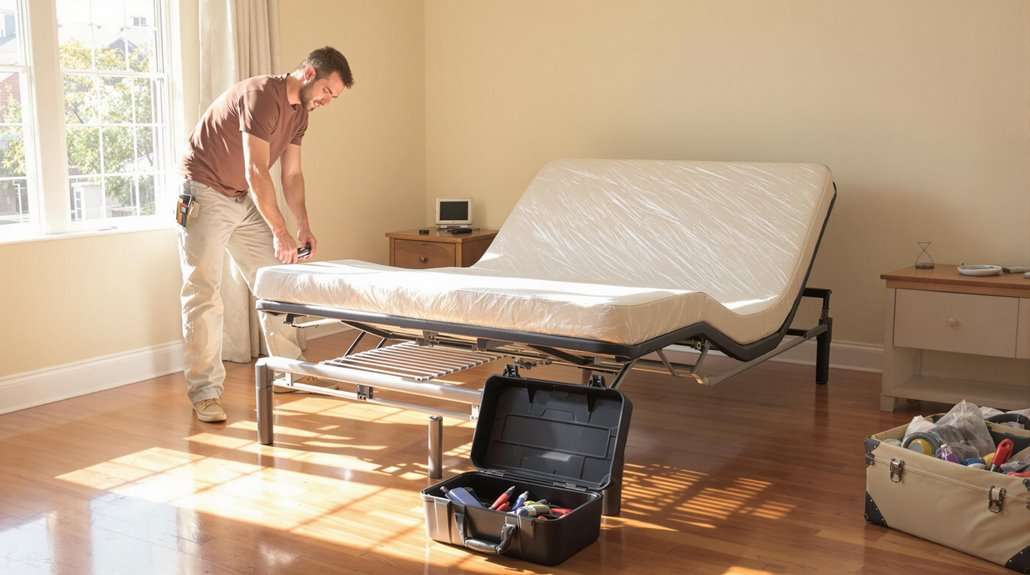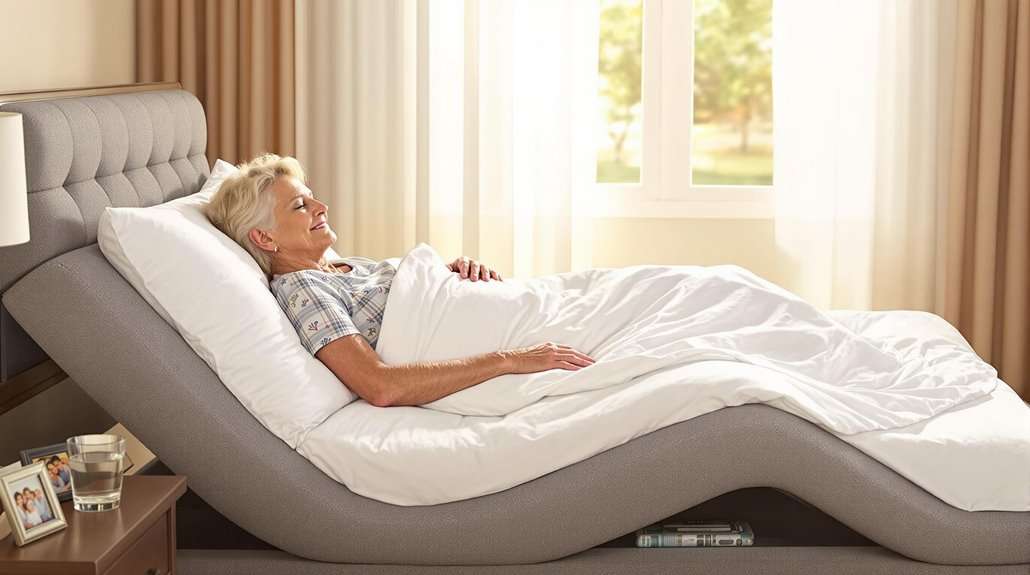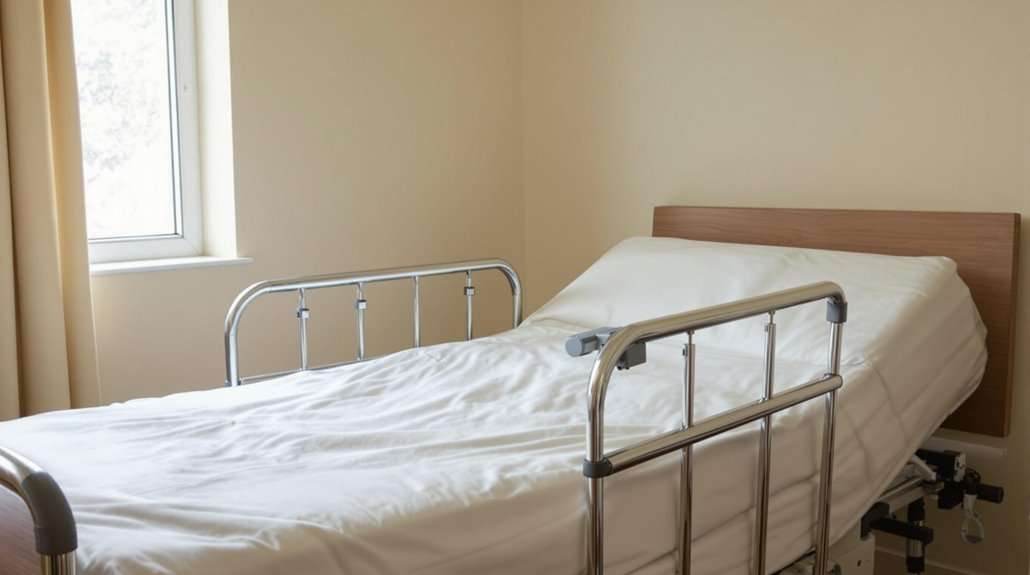Many seniors struggle with getting a good night’s rest. Sleep problems affect up to 50% of older adults, impacting their overall health and well-being. This blog post offers practical sleep hygiene tips tailored for seniors to improve their sleep quality.
Better sleep starts here.
📋✅
- Up to 50% of older adults face sleep problems, which can lead to health issues like heart disease, diabetes, and depression.
- Seniors need 7-9 hours of quality sleep each night for optimal health, memory, and immune function.
- Common sleep challenges for older adults include insomnia, sleep apnea, and restless legs syndrome, often caused by chronic pain, medications, or hormonal changes.
- Key sleep hygiene practices for seniors include maintaining a regular sleep schedule, creating a relaxing bedtime routine, and optimizing the bedroom environment with proper temperature (60-67°F), lighting, and comfortable bedding.
- If sleep problems persist for more than 2-3 weeks or interfere with daily life, seniors should seek medical advice to rule out underlying health conditions or adjust medications that may affect sleep.
The Importance of Sleep for Senior Health

Sleep plays a crucial role in senior health. Older adults need 7-9 hours of quality rest each night for optimal well-being. Proper sleep supports physical and emotional health, enhances concentration, aids memory formation, and bolsters the immune system.
Lack of adequate slumber can lead to irritability, forgetfulness, and a higher risk of accidents.
Sleep is the golden chain that ties health and our bodies together. – Thomas Dekker
Insufficient rest in seniors may trigger serious health issues. It increases the chances of cardiovascular disease, diabetes, and weight problems. For women, it can even raise the risk of breast cancer.
Depression and excessive daytime drowsiness often result from poor sleep habits. Addressing sleep concerns is vital for maintaining a high quality of life in the golden years.
Common Sleep Challenges in Older Adults
Sleep problems plague many older adults. Insomnia, sleep apnea, and restless legs syndrome often disrupt their nightly rest.
Causes of insomnia and sleep disturbances
Insomnia plagues many seniors, affecting their daily lives and overall health. Common culprits include chronic pain, medical conditions like arthritis or Alzheimer’s disease, and hormonal changes due to menopause.
Medications, particularly those for high blood pressure or depression, can disrupt sleep patterns. Poor sleep habits, such as irregular bedtimes or excessive screen time before bed, contribute to difficulty falling asleep.
Environmental factors like noise, light, or uncomfortable temperatures also play a role in sleep disturbances.
Stress and anxiety often lead to racing thoughts at night, making it hard for older adults to relax and drift off. Lack of physical activity during the day can result in restlessness at bedtime.
Sleep disorders such as sleep apnea or restless legs syndrome are more prevalent in seniors, causing frequent night awakenings. Untreated sleep apnea may lead to serious health issues like high blood pressure or memory loss.
Over-the-counter sleep aids, while tempting, can create dependency and worsen sleep problems in the long run.
Impact of aging on sleep patterns
As we age, our sleep patterns undergo significant changes. Growth hormone levels drop, deep sleep decreases, and melatonin production slows down. These shifts often lead to fragmented sleep and more frequent nighttime awakenings.
Many older adults find themselves going to bed earlier and waking up at dawn, a pattern known as advanced sleep phase syndrome.
Older individuals may experience less time in restorative sleep stages, such as slow-wave sleep. This can result in feeling unrefreshed upon waking, despite spending adequate time in bed.
However, it’s crucial to note that while sleep changes are common, severe insomnia isn’t a normal part of aging. Persistent sleep troubles may signal underlying health issues or sleep disorders that require medical attention.
Essential Sleep Hygiene Practices
Essential Sleep Hygiene Practices are key for seniors to get better rest. These habits can help older adults fall asleep faster and stay asleep longer.
Maintaining a regular sleep schedule
Maintaining a regular sleep schedule is crucial for seniors’ overall health and well-being. Caregivers play a vital role in helping older adults establish and stick to consistent sleep patterns.
- Set a fixed bedtime and wake-up time: Encourage seniors to go to bed and wake up at the same time every day, even on weekends. This helps regulate their body’s internal clock.
- Limit daytime napping: Avoid late afternoon or evening naps, as they can interfere with nighttime sleep. If necessary, restrict naps to 20-30 minutes earlier in the day.
- Create a relaxing bedtime routine: Establish calming activities before bed, such as reading, listening to soft music, or gentle stretching. This signals the body it’s time to wind down.
- Manage light exposure: Ensure seniors get at least two hours of sunlight daily. Consider using light therapy boxes during darker months to maintain circadian rhythms.
- Address sleep disturbances: Use earplugs or white noise machines to mask disruptive sounds like snoring or outside noise.
- Adjust bedtime gradually: If an earlier bedtime is needed, shift it in 15-minute increments over several weeks to allow the body to adapt.
- Monitor caffeine and alcohol intake: Limit these substances, especially in the hours leading up to bedtime, as they can disrupt sleep patterns.
- Encourage regular exercise: Promote daily physical activity, but avoid vigorous exercise close to bedtime.
- Keep a sleep diary: Track sleep patterns, habits, and any issues to identify potential problems and solutions.
- Consult a healthcare provider: If sleep difficulties persist, seek professional advice to rule out underlying health conditions or adjust medications that may affect sleep.
Creating a bedtime routine that promotes relaxation
Establishing a consistent bedtime routine helps seniors relax and prepare for sleep. Here are some effective practices caregivers can implement to create a soothing pre-sleep ritual:
- Set a regular bedtime and wake-up time, even on weekends
- Dim lights 1-2 hours before bed to signal the body it’s time to wind down
- Encourage a warm bath or shower to lower body temperature and induce drowsiness
- Play soft, calming music or nature sounds to create a peaceful atmosphere
- Guide gentle stretching or light yoga to release tension in the body
- Practice deep breathing exercises or meditation to calm the mind
- Read a book or listen to an audiobook to distract from worries
- Avoid screens and electronic devices that emit blue light at least an hour before bed
- Sip herbal tea like chamomile, which has natural sedative properties
- Use aromatherapy with lavender scents to promote relaxation
- Write in a gratitude journal to end the day on a positive note
- Apply a weighted blanket for a sense of comfort and security
Environmental factors also play a key role in promoting quality sleep for seniors. Let’s explore how to optimize the bedroom setup…
Environmental Adjustments for Better Sleep
The bedroom plays a key role in sleep quality for seniors. Small changes to light, sound, and temperature can make a big difference in how well older adults rest at night.
Optimizing the bedroom environment for comfort
Creating a comfortable bedroom environment is crucial for seniors to achieve restful sleep. Caregivers can help optimize the sleeping space by implementing these key strategies:
- Adjust temperature: Keep the room cool, around 60-67°F (15-19°C). Use breathable bedding and consider a fan for air circulation.
- Control light: Install blackout curtains or shades to block outside light. Use low-wattage bulbs in bedside lamps for gentle illumination.
- Reduce noise: Use white noise machines or earplugs to mask disruptive sounds. Consider soundproofing windows if external noise is an issue.
- Choose a supportive mattress: Invest in a high-quality mattress that provides proper support for aging bodies. Add a mattress topper for extra comfort if needed.
- Use comfortable bedding: Opt for soft, breathable sheets and pillowcases. Ensure blankets are the right weight for the season.
- Remove electronic devices: Keep TVs, computers, and phones out of the bedroom to minimize sleep disruptions and blue light exposure.
- Organize the space: Keep the room tidy and clutter-free to promote a sense of calm and reduce stress.
- Add safety features: Install nightlights for easy navigation and place emergency numbers near the bed for quick access.
- Use calming scents: Incorporate lavender or chamomile scents through diffusers or linen sprays to promote relaxation.
- Adjust humidity: Use a humidifier to maintain optimal moisture levels, especially in dry climates or during winter months.
The role of light and temperature in sleep quality
After optimizing the bedroom environment, it’s crucial to consider how light and temperature affect sleep quality. These two factors play a significant role in regulating our body’s natural sleep-wake cycle and overall comfort during rest.
- Light exposure:
- Natural sunlight helps regulate melatonin production, the hormone responsible for sleepiness
- Morning sunlight exposure can improve nighttime sleep quality and duration
- Evening exposure to blue light from electronic devices can disrupt sleep patterns
- Use blackout curtains or eye masks to create a dark sleeping environment
- Install dimmer switches or use low-wattage bulbs for evening lighting
- Temperature control:
- The ideal bedroom temperature for sleep is between 60-67°F (15-19°C)
- Body temperature naturally drops during sleep, so a cool room aids this process
- Use breathable bedding materials like cotton or bamboo to regulate body heat
- Consider a programmable thermostat to adjust temperatures throughout the night
- Warm baths before bed can help lower core body temperature, promoting sleepiness
- Seasonal considerations:
- Use humidifiers in winter to combat dry air that can disrupt sleep
- In summer, use fans or air conditioning to maintain a cool sleeping environment
- Adjust bedtime routines based on changing daylight hours throughout the year
- Light therapy:
- Light boxes can help regulate circadian rhythms, especially for those with seasonal affective disorder
- Exposure to bright light in the morning can improve daytime alertness and nighttime sleep quality
- Consult a sleep specialist before starting light therapy to ensure proper usage
When to Seek Professional Help
Sleep problems can signal deeper health issues. A doctor’s visit is crucial if sleep troubles persist for weeks or interfere with daily life.
Identifying signs that indicate the need for medical advice
Persistent sleep troubles lasting more than 2-3 weeks signal it’s time to consult a healthcare provider. Chronic insomnia or daytime sleepiness can point to underlying health issues that need attention.
Loud snoring, coupled with pauses in breathing during sleep, might indicate sleep apnea – a condition linked to high blood pressure and memory problems. Other red flags include difficulty staying awake during daily activities, frequent nighttime awakenings, or feeling unrefreshed despite adequate sleep time.
Mental health changes often accompany sleep disturbances. Increased anxiety, mood swings, or cognitive decline could stem from poor sleep quality. Seniors experiencing these symptoms alongside sleep issues should seek professional guidance.
A doctor can assess for potential causes like restless legs syndrome, periodic limb movement disorder, or medication side effects. They may recommend cognitive-behavioral therapy or other targeted treatments to improve sleep and overall well-being.
Sleep hygiene plays a vital role in seniors’ overall health and well-being. By implementing simple changes, older adults can significantly improve their sleep quality. Regular schedules, relaxing bedtime routines, and a comfortable sleep environment are key factors.
If sleep problems persist, seeking help from a healthcare provider is crucial. Remember, good sleep habits contribute to better physical and mental health, enhancing the golden years for seniors.
Related Questions
1. Why do seniors often have trouble sleeping?
Seniors may face sleeping problems due to health issues like Alzheimer’s disease or restless legs syndrome. Changes in sleep and aging can lead to feeling tired and insufficient sleep. Some seniors become light sleepers, making it hard to stay asleep.
2. How does caffeine and alcohol affect sleep in older adults?
Caffeine can disrupt sleep patterns, especially if consumed late in the day. Alcohol consumption might help you fall asleep faster, but it often leads to poor sleep quality and frequent waking during the night. Both can contribute to sleep-disordered breathing and feeling tired the next day.
3. What are some natural ways to improve sleep for seniors?
Aerobic exercise during the day can help improve sleep quality. Relaxation techniques like progressive muscle relaxation may ease anxiety and promote better sleep. Establishing a regular sleep schedule and creating a comfortable sleep environment are also helpful tips from the National Sleep Foundation.
4. Are sleeping pills safe for seniors?
While sleep medications can provide short-term relief, they’re not recommended for long-term use in seniors. They can lead to dependence and increase the risk of falls. It’s best to consult with a doctor or sleep medicine specialist before using any sleep medication.
5. How can cognitive-behavioral therapy (CBT) help with sleep issues?
CBT is a form of psychotherapy that can address chronic anxiety and other mental health issues affecting sleep. A cognitive behavioral therapist can help seniors identify and change thoughts and behaviors that interfere with sleep. This approach often yields better long-term results than sleeping pills.
6. What role does REM sleep play in senior health?
REM (rapid eye movement) sleep is crucial for cognitive function and emotional well-being. As we age, we tend to get less REM sleep, which can affect memory and mood. Improving overall sleep hygiene can help increase the amount of REM sleep, potentially offering health benefits like better cognitive function and emotional regulation.
